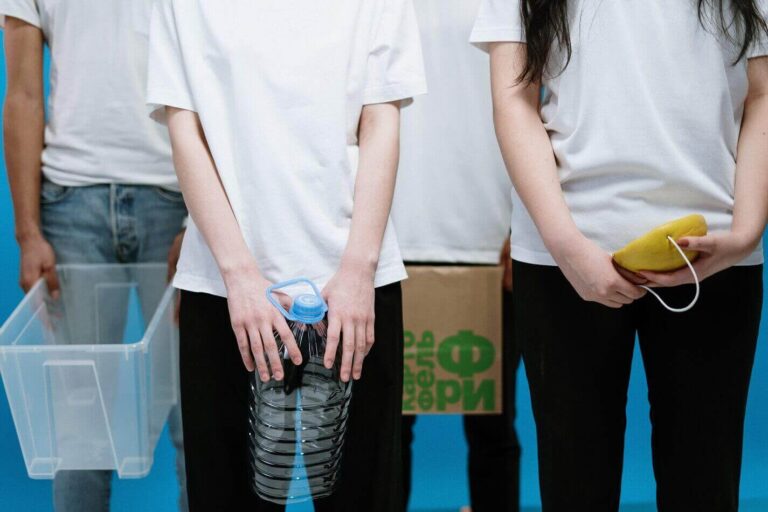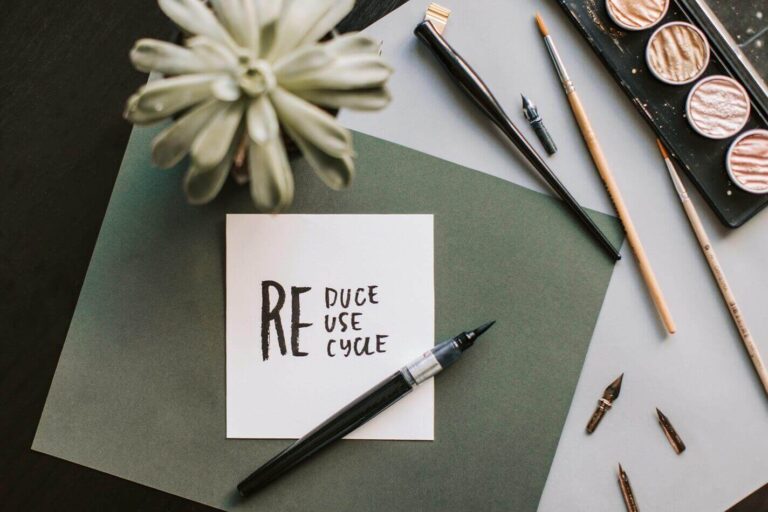How To Get Rid Of Your Waste Responsibly Without Harming The Environment | Sustainable Living
ki sa k ap viv dirab?
In recent years, we have seen an increasing consciousness about the environmental footprint we leave on this planet, as a response to all the consequences our past and current actions have on the environment surrounding us. Li pa ka nye enpak nou te genyen sou monn sa a, ak nesesite pou chanje li byento, e se la kote lavi dirab antre nan jwèt.
What is sustainable living, you may ask? Oke, lavi dirab konsiste de aksyon sa yo nou pran nan lavi chak jou nou yo nan lòd yo redwi enpak anviwònman nou an nan yon minimòm., either by eating a sustainable diet, finding ways to reduce waste, consuming fewer things we don’t need… Gen anpil opsyon pou nou chwazi nan lè li rive viv yon vi ki pi dirab ak zanmitay anviwònman an.
An konklizyon, yon vi dirab se youn ki vize diminye anprint anviwònman nou sou planèt sa a, yon mond ke n ap detwi malerezman ak aksyon neglijans nou yo chak jou e youn ke nou pa janm ka ranplase.We highly recommend that you first check out Ki jan yo gen yon rejim dirab nan kay la.
how you can reduce waste at home and live more sustainably
There are many ways to achieve a sustainable lifestyle, one of them is of course reducing our waste, one of the most polluting and material byproducts of our existence. Doing so is no easy task either, but with just a few small changes in our habits, we can achieve a massive change for the better in this world. Having said this, here are the best ways to reduce waste and live more sustainably at home:
- Recycle, one of the best ways of handling the waste we produce is by recycling it. Not only do we make sure our waste is not going to further pollute our rivers, seas, waters, and soil, but we also make sure that we give a second life to the waste, reducing the necessity to create more materials that will end up polluting our planet even more. Check out how easy it is to recycle with the Environmental Protection Agency’s article.
- Compost, this is a great way of handling organic waste, like banana peels, coffee grounds and filters, eggshells… By composting at home you can make sure that your organic waste is not taking up unnecessary space in the landfill, and resources to transport it to the landfill, but also avoid polluting the air with methane that is produced in the landfill. Not only that, but you are also creating a new type of soil enrichment full of nutrients that help new plants grow and thrive, without the need for potentially harmful fertilizers and other man-made nutrients. Overall, composting is something that is really worth doing at home and could have many benefits to it, tcheke atik sa a deyò to dive deeper into this subject.
- Reuse, an equally important step to reduce waste and the environmental impact we have on this planet, reusing something instead of throwing it out is an excellent option, saving not only the environment but also saving you money that you would have spent on something that you clearly did not need to buy. This is one of the most preferred methods of reducing waste, as people are economically incentivized to do it.
- Anaerobic Digestion, this is a pretty interesting topic in itself and an awesome way to handle our waste, it consists of letting bacteria decompose our waste in a sealed container or generator, producing various byproducts like biogas or digestate that could be used as productive materials in the creation of other useful products.
- Reduce, this is one of the most straightforward of all these ways to reduce waste, simply reduce your consumption of things you do not need and you will produce less waste overall. You don’t have to be a cheapskate, you only have to think before you buy (a great way to do that is using the 7-day rule, wait 7 days before you buy something to see if you really want it or need it, you will be surprised most of the time you stop wanting the item in just a few days), not only will you reduce waste, but you can be a lot more financially free.
Overall, these are the best and simple ways to reduce waste in your own home, we are going to go into more detail about all of them in a second, so you can learn more about them and how you can do them at home.

the three r's in a sustainable waste reduction plan
We have seen the best ways to reduce waste at home, and you may have noticed that many of the ways we have seen start with the letter R, that is no coincidence (or maybe it is), because they are part of the famous three R’s of a sustainable waste reduction, which are a great way of remembering the steps to take to live more sustainably, here is what you need to know:
The three R’s stand for Recycle, Reuse and Reduce, which is what we talked about before. Recycling, reusing, or reducing our consumption alone are great ways to improve our sustainability, but the real magic comes when we combine these all. If you can reduce your consumption, reuse the things you already own instead of throwing them away, and recycle your waste, you can really reduce your environmental footprint to a minimum.
So now you know, you can achieve the most out of products you own by implementing this simple and straightforward three R’s rule, but you may surely already know that, so why don’t we go to the next point?

composting and organic anaerobic digestion
The next step is to reduce the impact of your organic waste because even this type of waste has an environmental impact on our planet. You can do this by composting organic materials, which creates a natural nutrient-rich fertilizer that the plants need to thrive. We already have talked about this so let’s go to a very common question about composting and anaerobic digestion.
What is the difference between composting organic waste and anaerobic digestion? The answer is simple, composting is the process of decomposing organic waste with oxygen present, while anaerobic digestion takes place without any oxygen present, neither air for that matter. The process of decomposing is quite similar, as we have seen before.
How to create a DIY Anaerobic Digestion device at home to naturally decompose your organic waste and produce useful methane and fertilizer that you can use for yourself? Well, they say a picture is worth a thousand words, and a video is composed of thousands of photos, so you may be interested in this video that will show you just that:
rezime
We hope you have learned a lot today about how to reduce your waste because so did we. The most important takeaway is that it is not hard to achieve a sustainable lifestyle following these directions, you just have to start doing them, you will never reduce your environmental footprint if you don’t ever start doing something to change it.
Nou kontan pou nou anseye moun atravè mond lan 🙂 Epitou,èske w te reyèlman konnen kisa Fast Fashion se reyèlman ak konsekans terib li yo pou anviwònman an, planèt la, travayè yo, sosyete a ak ekonomi an?Èske w konnen egzakteman kisa mouvman Slow Fashion oswa Sustainable Fashion?Ou ta dwe reyèlman pran yon gade nan atik sa yo sou sijè sa a bliye ak enkoni men trè ijan ak enpòtan,klike la a pou w li "Èske mòd ka toujou dirab?",Mòd dirab,Mòd etik,Sou entènèt jwèt Ralanti FashionoswaFast Fashion 101 | Kijan li ap detwi planèt nou anpaske konesans se youn nan pi fò fòs ou ka genyen, alòske inyorans se pi move feblès ou.
Nou menm tou nou gen yon gwo sipriz pou ou!Paske nou vle ba w dwa pou w konnen nou pi byen, nou prepare yon paj Sou Nou ki dedye ak anpil atansyon kote n ap di w kiyès nou ye, ki misyon nou ye, kisa n ap fè, yon gade pi pre ekip nou an ak anpil lòt bagay ankò. bagay yo!Pa rate opòtinite sa a akklike la a pou tcheke li.Epitou, nou envite ougade nouPinterest,kote nou pral mete chak jou kontni dirab ki gen rapò ak mòd, desen rad, ak lòt bagay ke ou pral siman renmen!
Gaye mesaj la:
- Klike pou pataje sou Pinterest (Ouvè nan yon nouvo fenèt)
- Klike pou pataje sou Twitter (Ouvè nan yon nouvo fenèt)
- Klike pou pataje sou Facebook (Ouvè nan yon nouvo fenèt)
- Klike pou pataje sou WhatsApp (Ouvè nan yon nouvo fenèt)
- Klike pou pataje sou Reddit (Ouvè nan yon nouvo fenèt)
- Klike pou pataje sou Telegram (Ouvè nan yon nouvo fenèt)
- Klike pou pataje sou LinkedIn (Ouvè nan yon nouvo fenèt)
- M minrè
